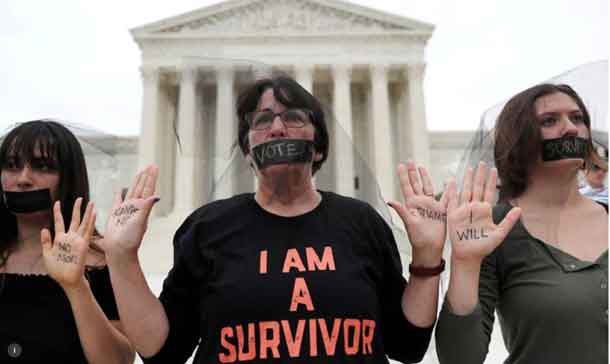

Fueled by Trump’s statements about women and the #MeToo movement, a record number of women are running for Congress this year
By Amanda Becker
WASHINGTON, (Reuters) – As women rallied at the U.S. Capitol to protest Brett Kavanaugh’s confirmation to the Supreme Court on Saturday, activist Linda Sarsour flew from Washington to Texas with her eyes on the next challenge: the Nov. 6 congressional elections.
Sarsour, a leader of the Women’s March organization, said it was time to harness women’s furor around Kavanaugh to galvanize voters in races that will soon determine which party controls Congress.
“This is not the end,” Sarsour, 38, said in a telephone interview. “I think the rage will be translated into mass voter turnout.”
Women’s March, which grew out of the massive January 2017 demonstrations protesting Donald Trump’s presidency, mobilized thousands of women during Kavanaugh’s confirmation process over concerns about how the conservative judge would vote on issues such as abortion, and allegations that he sexually assaulted university professor Christine Blasey Ford when they were teenagers in 1982.
Sarsour said the group will use its vast digital infrastructure to get hundreds of thousands of women to support Democrats in dozens of U.S. House of Representatives races and to target incumbent Senate Republicans Ted Cruz in Texas and Dean Heller in Nevada.
Polls show Cruz and Heller, who both voted for Kavanaugh’s confirmation, in tight contests.
Planned Parenthood Action Fund, which advocates for women’s health care and abortion access, launched a digital ad in Nevada this week criticizing Heller for calling sexual assault allegations against Kavanaugh a “hiccup” in the confirmation process.
Women are playing a key role in the first midterm election since Trump’s 2016 victory. Fueled by his statements about women and the #MeToo movement, a record number of women are running for Congress this year.
Women who live in suburbs, where some of the most competitive House races will be contested, have trended away from Republicans in recent polls and may be further energized by the Kavanaugh debate.
Activists are also encouraged by the response to a crowdfunding effort focused on Republican Senator Susan Collins, a possible swing vote who ultimately voted for Kavanaugh. More than $3.2 million was pledged to help her future opponent in 2020 when the Maine senator is up for re-election.
“Starting tomorrow, it’s not unlikely we ask those 130,000 donors to start to support some of the Senate Democrats in really tough races this year,” said Liz Jaff, co-director of Be A Hero, which advocates for healthcare causes.
Jaff cited Heidi Heitkamp of North Dakota and Claire McCaskill in Missouri, who both opposed Kavanaugh and face serious challenges in states won by Trump.
Conservative groups also vowed to keep the confirmation battle at the forefront of voters’ minds.
“Americans saw through the vilification of an exceptionally qualified nominee, and their senators will be held accountable,” Marjorie Dannenfelser, president of the anti-abortion group, Susan B. Anthony List said in a statement.
(Reporting By Amanda Becker in Washington Editing by Colleen Jenkins and Bill Berkrot)





